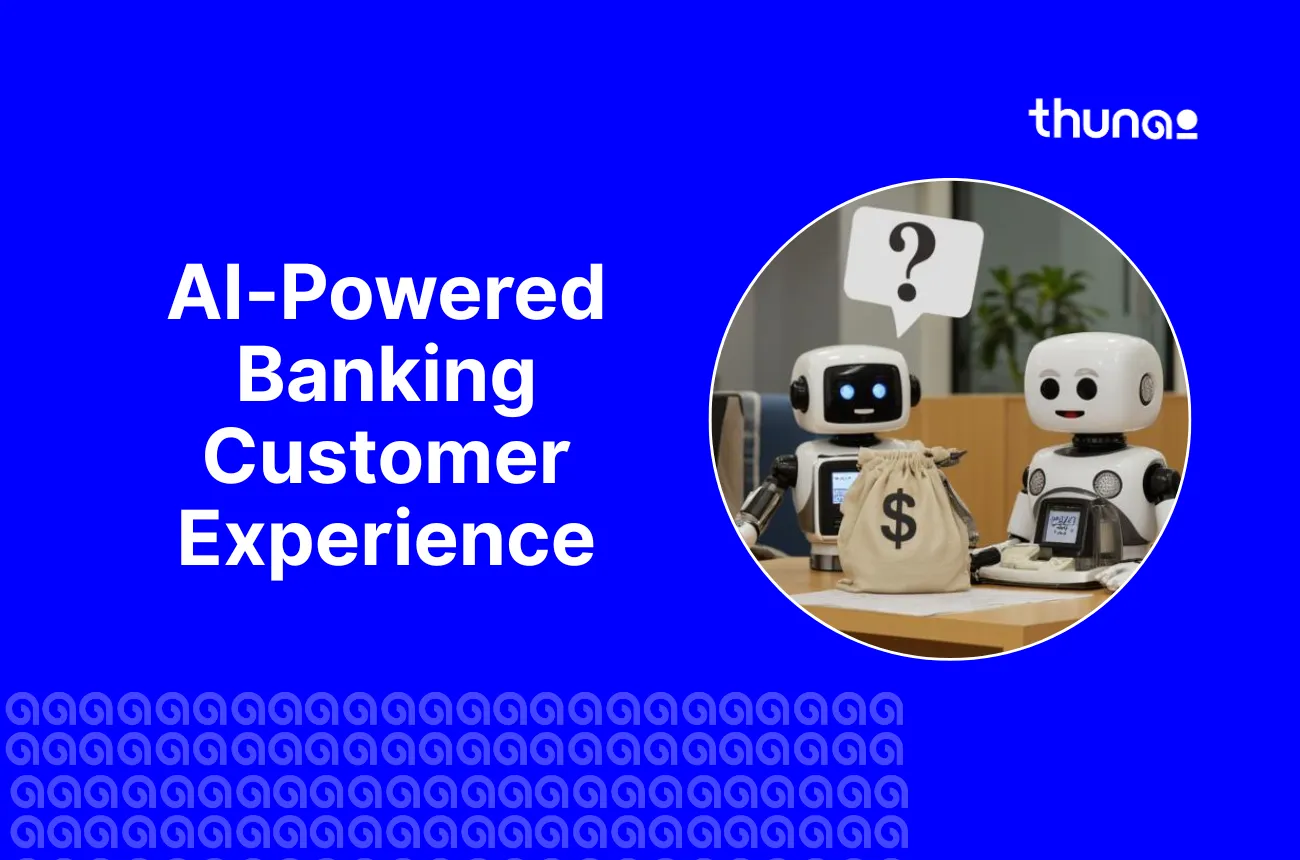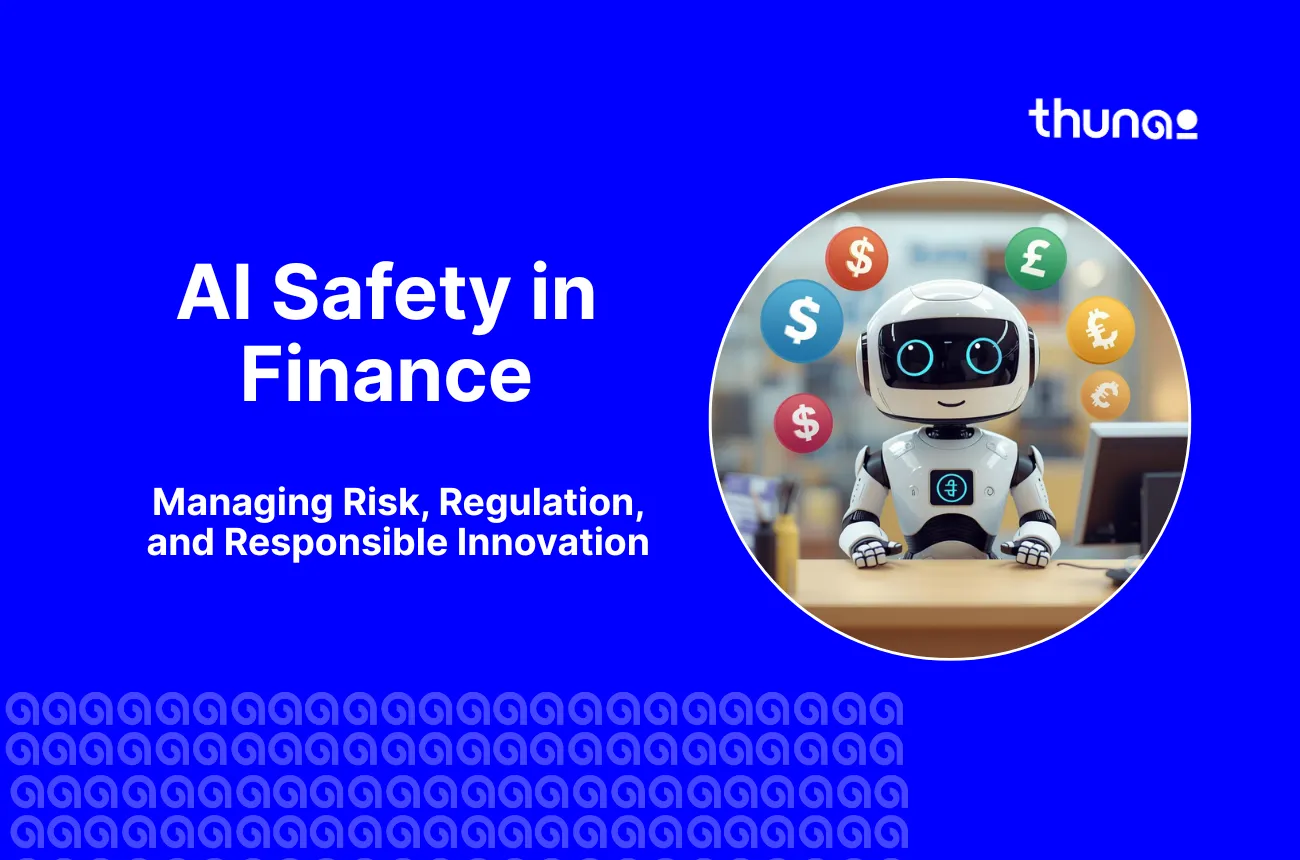Omnichannel Support Software - 9 Top Reviewed Picks in 2025



Thunai learns, listens, communicates, and automates workflows for your revenue generation team - Sales, Marketing and Customer Success.
TL;DR
Summary
- Traditional help desks like Zendesk and Freshdesk handle ticketing well but often have expensive per-agent pricing and user-reported support issues.
- Modern omnichannel platforms like Thunai leverage agentic AI to automate entire resolutions, combining voice, chat, and email with a central AI brain and unlimited-seats pricing.
- Teams already using a CRM ecosystem favor HubSpot Service Cloud and Salesforce Service Cloud for a unified, 360-degree customer view across sales, marketing, and service.
- Businesses with specific e-commerce needs choose Gorgias AI for its deep Shopify integration and tailored omnichannel support capabilities.
Your old help desk showed you a unified inbox.
But is that everything? Your company needs more than just a single list. You need to automate resolutions, lower costs, and help your team work through problems, not just route tickets. You might be looking for a more affordable, AI-based, or flexible option.
We’ve rounded up the top omnichannel support software to work with to help you out with this.
What Is Omnichannel Customer Support Software?
Omnichannel customer support software are platforms that bring together all customer interactions from every channel. These channels include email, phone, live chat, social media, and SMS. The software pulls them into a single, continuous conversational thread.
Unlike multichannel support, where channels are available but disconnected, an omnichannel platform sets up a unified agent workspace. This helps agents get the complete context of a customer's history. This is true regardless of how or when they last reached out. The main goal is to set up a smooth, consistent, and unified customer experience across all touchpoints.

Why Omnichannel Customer Support Matters for Modern CX Teams
For modern customer experience (CX) teams, an omnichannel method is no longer a luxury. This is a must-have.
The primary benefit of omnichannel support software lies in setting up a true 360-degree view of the customer. When an agent can see every previous marketing email, sales deal, and support chat in one place, they are equipped with the full context. This lets them work through problems well.
This gets rid of the customer's greatest frustration. With omnichannel support software, they no longer have to repeat themselves every time they switch channels.
For the business, this unified view leads to faster resolution times and higher customer satisfaction (CSAT). This also leads to improved agent productivity. Agents no longer need to switch between different tools to piece together a customer's history.
Key Features of Top Omnichannel Support Software
- Unified Omnichannel Inbox: Omnichannel support software brings together conversations from email, chat, phone, social media, and messaging apps (like WhatsApp) into a single agent workspace.
- Advanced Ticketing System: Key help desk functions, which cover intelligent routing, ticket categorization, SLA management, and internal collaboration tools like side conversations.
- AI and Automation: Omnichannel support software also has AI-based chatbots (like Intercom's Fin or Freshdesk's Freddy) for handling simple questions. It also has AI assistants (copilots) to help human agents and workflow automation to take care of repetitive tasks.
- Self-Service Solutions: Tools to set up and look after complete help centers, knowledge bases, and community forums. These help customers find their own answers.
- Reporting and Analytics: Dashboards and custom reports to keep track of key metrics like CSAT, first-response time, resolution time, and agent performance.
- CRM & E-commerce Connections: Strong connections to key business platforms like CRMs (Salesforce, HubSpot) and e-commerce platforms (Shopify) to give complete customer context.
Thunai.ai’s Take: How Agentic AI Elevates Omnichannel Customer Support
Traditional omnichannel support software successfully solves the problem of bringing things together. This brings all channels into one view.
However, the resolution still falls on the human agent. The next development of customer service is not just about bringing channels together. This is about automating entire workflows across them. This is the difference between a simple chatbot and true agentic AI.
Simple chatbots answer common questions. Agentic AI platforms, like Thunai, are engineered to carry out actions. This is achieved by moving beyond a simple knowledge base. The platform uses a centralized AI brain. This is a multimodal hub that takes in and understands all company knowledge. This includes documents, videos, CRM data, and call transcripts.
This brain then looks after a suite of specialized agents:
- Voice Agents that can deal with calls in over 80 languages. They turn calls into tickets and even use screen sharing for tech support.
- Email Agents that take care of contextual replies and log data to your CRM automatically.
- Chat Agents that hand out script-free, context-aware answers.
The Benefits of Using Omnichannel Support Software
The business case for omnichannel customer support is clear. This impacts both the customer and the company.
- Improved Agent Productivity: By bringing all interactions together, agents cut out wasting time switching between applications. A unified workspace with full customer context allows them to solve problems faster.
- Higher Customer Satisfaction: With omnichannel support software, customers receive a smooth experience. They can start a conversation on chat, continue it over email, and follow up with a phone call. They never have to repeat their issue.
- Better Data and Insights: A unified platform pulls together all interaction data. This sets managers up with a single source of truth for analytics. It helps them spot trends, pain points, and opportunities for improvement.
- Increased Revenue Opportunities: For e-commerce and sales-focused teams, omnichannel tools can turn support into a revenue generator. Omnichannel support software like Gorgias and Intercom are great at proactive engagement. They turn support conversations into sales opportunities.
Criteria for Choosing the Best Omnichannel Customer Service Solution
- AI Maturity (Agentic vs. Chatbot): Do not just look for a chatbot. Does the AI just answer questions, or is it an agentic AI that can automate multi-step workflows? Look for omnichannel support software built around a central AI brain that can carry out tasks.
- Pricing Model and TCO: The per-agent pricing model is the key financial pain point of legacy vendors. This model holds you back from growing your team. Look for disruptive models that have unlimited seats. These are instead based on usage (like AI credits), which links costs to value, not headcount.
- Connection and Actionability: A good platform connects with your CRM. A great platform can take action within your CRM. Check to see if the connection is just for data display. Or, find out if it allows true, AI-based workflow automation within third-party tools.
- Growth Potential and Complexity: Look out for hidden costs. Many platforms lock essential features behind high-tier plans or costly add-ons. A platform like Salesforce is extremely strong but needs expensive, specialized administrators. Find an omnichannel support software that can scale up with you without unpredictable costs or overwhelming complexity.
Pricing and Cost Comparison: Omnichannel Customer Support Software
Pricing models are a key differentiator in this market. They range from per-agent fees to usage-based or ticket-volume models.
| Platform | Pricing Model | Noted Weakness |
|---|---|---|
| Thunai | Basic plans start at $79 and have usage-based (AI credits) with unlimited seats | Unclear market presence & inconsistent public data |
| Zendesk | Per-agent, tiered, with add-ons | High cost, complex pricing, poor user support |
| Intercom | Per-seat + usage-based (per-resolution) | Expensive, complex usage-based pricing |
| HubSpot Service Cloud | Per-seat, tiered (Freemium available) | Service features less mature than competitors |
| Freshdesk | Per-agent, tiered (Freemium available) | Can feel overwhelming; support quality varies |
| Gorgias AI | Ticket-volume-based | Niche specialty, unpredictable ticket-based pricing |
| Zoho Desk | Per-agent, tiered (very affordable) | UI can be clunky; steep learning curve |
| Salesforce Service Cloud | Per-user, tiered, complex add-ons | High complexity, very expensive, requires specialists |
| Tidio | Conversation/visitor-based (Freemium available) | Lacks enterprise depth, can be outgrown |
The Role of Agentic AI Middleware in Unifying Omnichannel Workflows
Traditional omnichannel software acts as a container. It unifies your siloed channels into one inbox. Agentic AI middleware, in contrast, acts as an intelligent layer. It sits on top of your entire tech stack.
This middleware method is central to next-generation platforms like Thunai. This is built around an AI brain designed to take in and understand all of your company's knowledge. This is not just help articles. It also includes SOPs, CRM data, call transcripts, and videos.
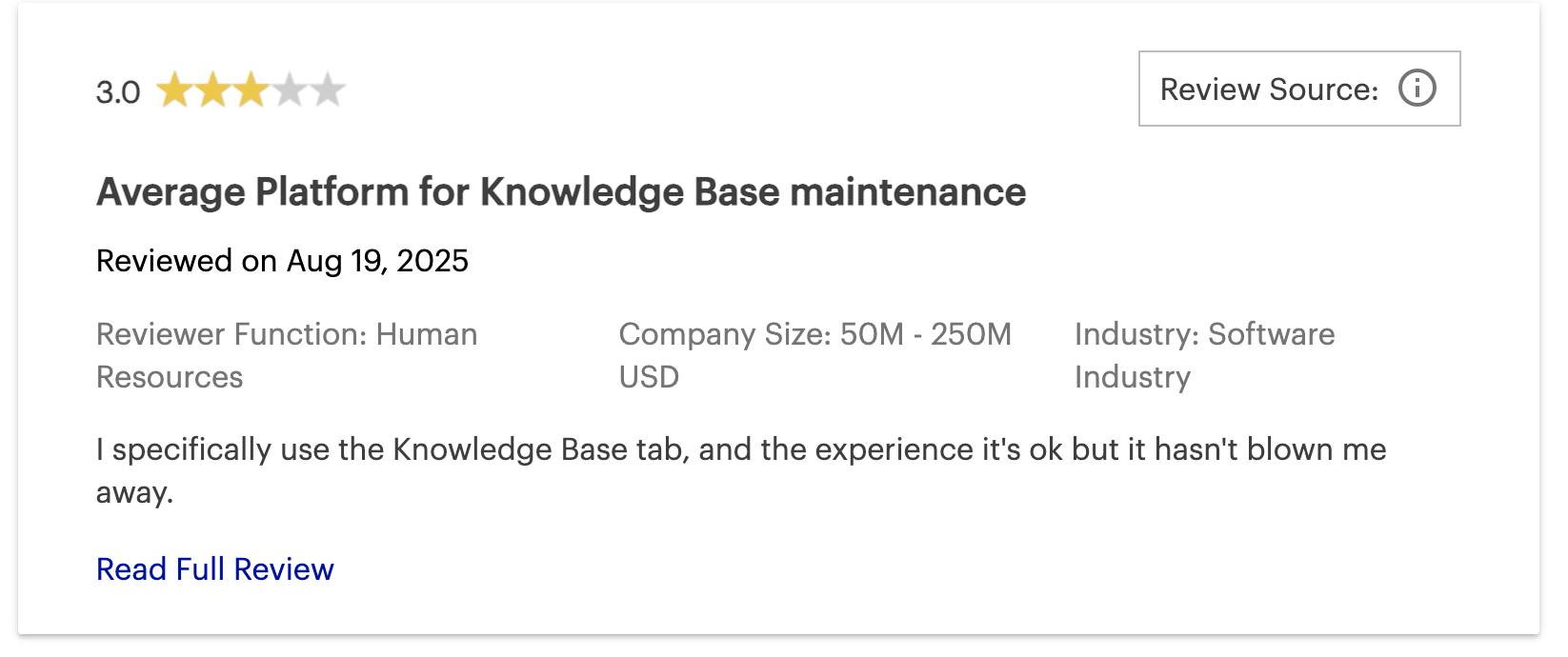
This central intelligence then looks after AI agents that can do more than just talk.
They can carry out complex, cross-functional workflows - and with a no-code, easy-to-use interface, which is where some users feel Intercom can be lacking.
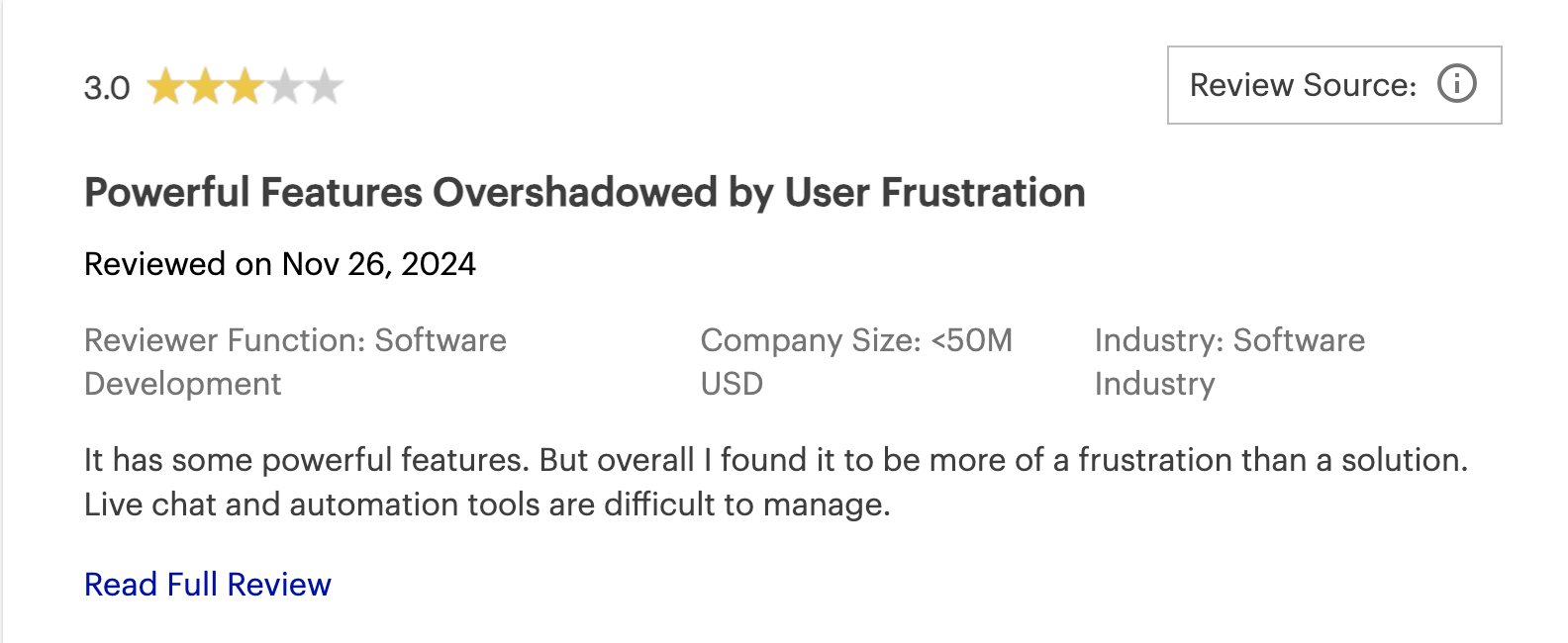
On the flip side of this, you have an overall amazing tools like Zendesk that keep increasing its price year on year - something that options like Thunai or Zohodesk avoid.
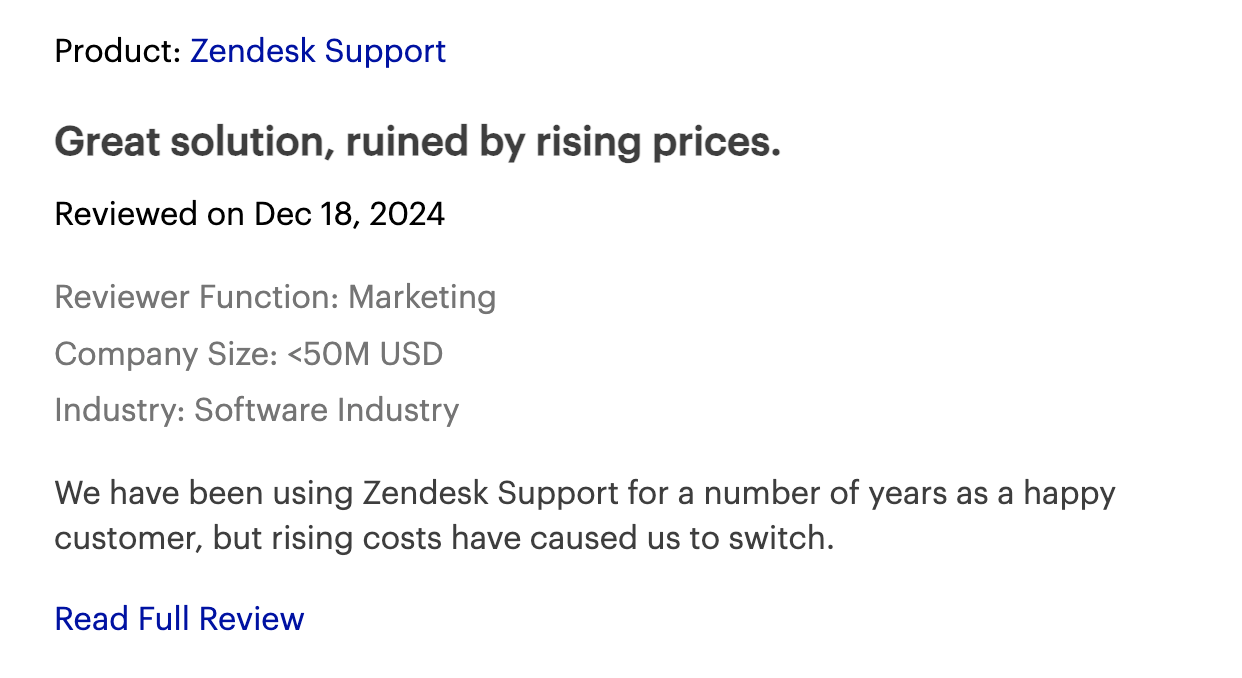
But in the case of full automation for example, a customer's email about a broken item can kick off an agentic workflow on Thunai that:
- Checks on the customer in your Salesforce CRM.
- Checks the order status in your e-commerce platform.
- Generates a return shipping label.
- Sends a contextual reply to the customer with the label.
- Puts down the entire interaction and new ticket status in the CRM.
This is the important difference between a unified inbox and a unified brain. The middleware carries out the work, turning discovered knowledge into automated action.
Top Omnichannel Software Platforms Reviewed (2025 Edition)
1. Thunai
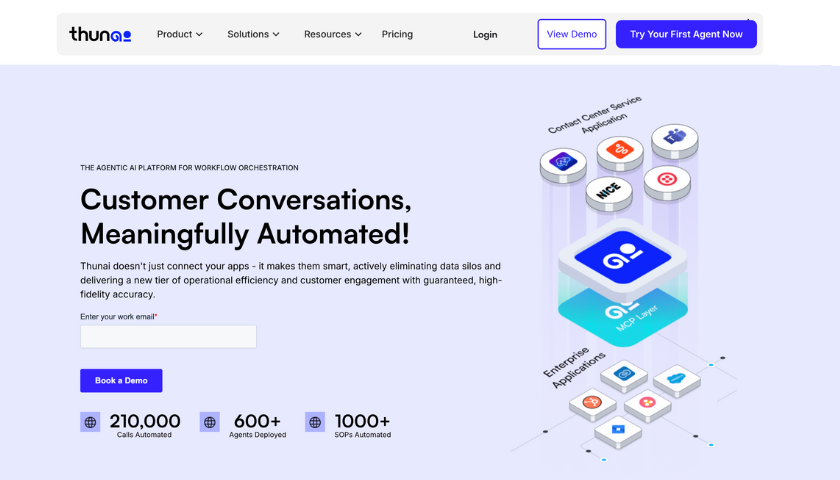
Thunai presents itself as a next-generation AI hub and AI-powered companion. This is engineered to convert a company's dispersed knowledge into intelligent, automated workflows. Its scope reaches beyond traditional customer service. It also includes sales, marketing, and internal operations.
This omnichannel support tool is architected around a central AI brain. This omnichannel support software represents the emerging category of Al-native innovators. A major concern for due diligence, however, is the big contradiction in its publicly available corporate data.
One of its most disruptive plans is its unlimited seats pricing model. This directly goes after the key financial pain point of legacy, per-agent vendors.
This is the top omnichannel customer service software for enterprises looking for AI-native automation and an unlimited seats model.
What Makes Thunai the Best Omnichannel Alternative?
- Thunai Brain: This is the centralized, multimodal knowledge hub. It's built to take in diverse data formats. These include documents, videos, CRM data, and conversation transcripts. This data is used to run on its suite of AI agents. Thunai claims this method can cut down on AI hallucinations by up to 95%.
- Specialized AI Agents: Thunai has a suite of action-oriented agents for specific functions:
- Voice Agent: Capable of dealing with calls in over 80 languages. It turns calls directly into tickets. It can even use screen sharing for real-time technical support. It's built to head off as much as 90% of routine call volume.
- Chat Agent: Hands out script-free, context-aware responses by drawing directly from the Thunai Brain.
- Email Agent: Takes care of and sends contextual replies. It captures insights from email threads. It also connects with CRM systems for automated data logging.
- Application Agent: Stretches automation into third-party applications. One example is generating and posting content on platforms like LinkedIn.
- Native Workflow Automation: A key differentiator is Thunai's ability to turn a company's Standard Operating Procedures (SOPs) into executable workflows. This allows AI agents to take direct actions within connected systems like Salesforce and HubSpot. It does this without relying on intermediary automation tools.
Thunai vs. Zendesk Compared
| Feature | Thunai | Zendesk |
|---|---|---|
| Main Function | AI-native automation hub | Mature, ticket-based help desk |
| AI Method | High (Agentic AI, AI Brain) | Moderate (Mature but can be a costly add-on) |
| Pricing Model | Usage-based with unlimited seats | Per-agent, tiered, with add-ons |
| Best For | Automating cross-functional workflows | Businesses needing a strong, ticket-based help desk |
| Weakness | New to market, inconsistent corporate data | High cost, complex pricing, bad user support |
Thunai Pros:
- Users on Product Hunt talk up the AI brain for bringing together scattered company knowledge into a single, context-aware resource.
- Strong, clean workflow automation is consistently pointed out as a main strength.
- Agentic, self-learning AI is seen as a significant advancement over simpler, script-based chatbots.
- Company-published case studies point to substantial business impact. This includes a 78% ticket deflection rate and a 30% lowering of costs.
Thunai Cons:
- A pronounced lack of independent, third-party user reviews on major platforms like G2 and Capterra is a major concern. Slashdot explicitly says No User Reviews for the product.
- The risk of AI inaccuracy remains. The claim of cutting down on hallucinations by 95% is a self-reported metric.
- While marketed as no-code, setting up enterprise-level agentic workflows is likely a substantial and tough project.
- The inconsistent public data on its corporate history and funding brings in a level of risk. It also creates a need to get direct clarification.
Thunai Pricing:
- Uses a tiered, usage-based subscription model. It comes with unlimited seats on all plans.
- Free plan: $0 for 100 AI Credits & 512MB Brain Storage.
- Starter: $9 for 270 Credits & 512MB Storage.
- Basic: $99 for 540 Credits & 2GB Storage.
- Standard: $199 for 1000 Credits & 20GB Storage.
- Premium: $499 for 2000 Credits & Unlimited Storage.
- This model moves the cost from personnel headcount to platform usage. However, high-volume contact centers could quickly use up credit limits.
2. Zendesk
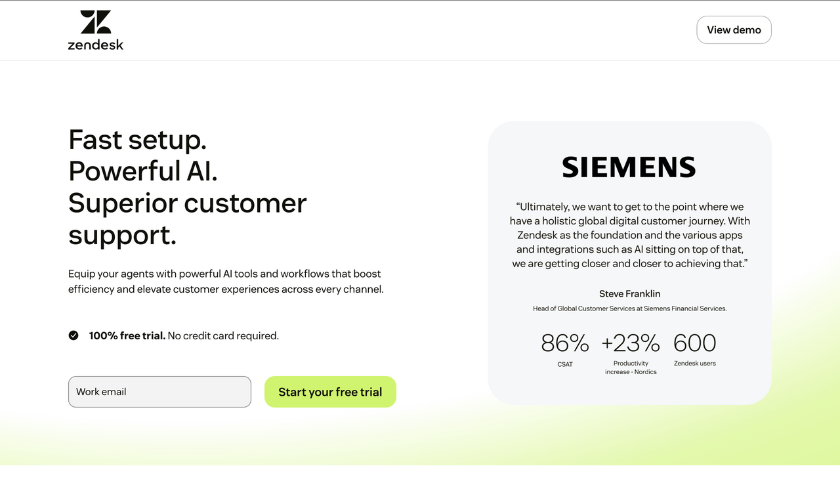
Zendesk is a foundational pillar of the customer service software industry. It is a recognized market leader. Founded in 2007, it pioneered the SaaS model for help desk solutions. A formative event in its history was a 2010 customer backlash over a substantial price increase. This forced a public apology. In 2022, the company was taken private in a $10.2 billion deal.
This is the top omnichannel customer service software for businesses from SMB to Enterprise that need a mature, feature-filled ticketing system.
Features:
- Advanced Ticketing System: This is the foundation of its system. It comes with sophisticated tools for intelligent routing, SLA management, and internal collaboration features like side conversations.
- Zendesk AI: This includes intelligent bots and AI-based triage that automatically categorizes and routes tickets. It also has generative AI tools to help out agents with summaries and replies.
- Self-Service Solutions: Strong tools for setting up and looking after a complete help center and community forums.
- Extensive Marketplace: A major strength is its vast app marketplace. It has hundreds of pre-built connections to other tools.
Pros:
- The day-to-day agent interface is consistently praised. Users find it user-friendly, well-organized, and easy to get the hang of.
- Its main ticketing system is widely regarded as a best-in-class, dependable, and highly customizable solution.
- It effectively pulls together all customer conversations from various channels into a single view. This gives agents complete customer context.
Cons:
- This is the most common and strongly worded complaint. Users consistently call the pricing expensive. It is frequently called expensive AF on Reddit. Users also find it confusing and unpredictable.
- Essential features are often locked behind costly upgrades and add-ons.
- In a deeply ironic twist, Zendesk is widely called out. It is known for handing out poor customer support to its own paying customers. Reports of slow response times and extreme difficulty in getting to a human are common.
- Multiple Reddit threads talk about an arduous and user-unfriendly cancellation process. Some call the practice a scam.
Zendesk Pricing:
- Uses a tiered, per-agent, per-month model.
- Suite Team: $55/agent/month (annual billing).
- Suite Growth: $89/agent/month (annual billing).
- Suite Professional: $115/agent/month (annual billing).
3. Intercom
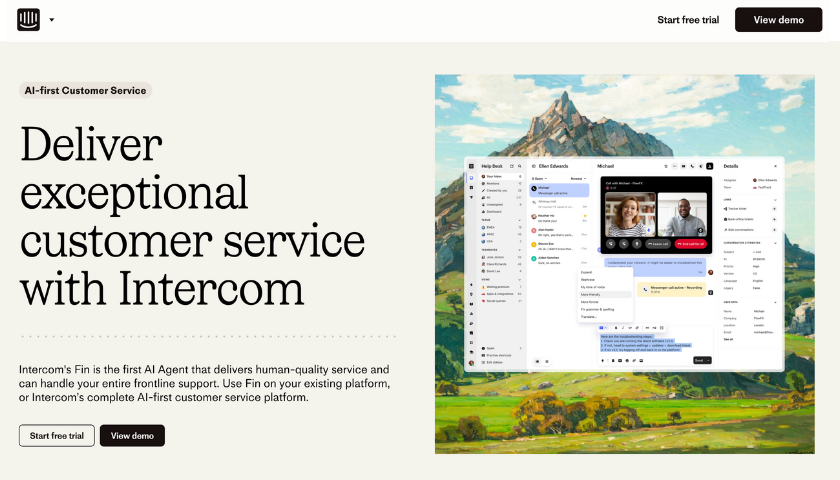
Intercom has established itself as a premier customer service platform with an AI-first setup. Founded in 2011, its philosophy is built around managing the customer lifecycle.
The omnichannel support software does this through its Messenger (live chat widget) and a sophisticated ecosystem of proactive messaging and AI bots.
This is the top omnichannel customer service software for SMBs and Mid-Market companies that want conversational engagement and a strong AI agent.
Features:
- Fin AI Agent: This is Intercom's flagship product and a leader in the AI chatbot space. Fin is designed to autonomously solve a high percentage of customer queries. It averages a 57% resolution rate. It can be trained on a company's knowledge base.
- AI Copilot: An AI-based assistant for human agents. It hands out real-time coaching, summarizes conversations, and suggests replies.
- Proactive Support and Outbound Messaging: A main strength is its ability to send out automated, targeted messages based on user behavior. This is used for onboarding new users or announcing features.
Pros:
- It is almost universally praised for its clean, modern, and intuitive design (UX/UI).
- The Intercom Messenger is considered a market leader for real-time, proactive customer engagement.
- The Fin AI Agent is recognized as a genuinely strong tool. It successfully automates a significant volume of inquiries.
Cons:
- This is the biggest and most consistent complaint. The mix of high per-seat fees and the usage-based AI cost makes it unaffordable for many.
- The Fin AI Agent is billed at $0.99 per resolution. This sets up a penalty for success dynamic. As the AI gets better and takes on more queries, the monthly bill increases proportionally. One user reported their bill shot up by 120%.
- Similar to Zendesk, Intercom deals with widespread criticism for the poor quality of its own customer support.
- The platform's AI works best with its own article system. This creates a closed ecosystem that can lead to vendor lock-in.
Intercom Pricing:
- A hybrid model combining a per-seat fee with a usage-based fee for AI.
- Essential: $29/seat/month + $0.99 per resolution.
- Advanced: $85/seat/month + $0.99 per resolution.
- Expert: $132/seat/month + $0.99 per resolution.
4. HubSpot Service Cloud

HubSpot Service Cloud (Service Hub) is the customer service component of the all-in-one HubSpot Customer Platform. Its key strength is its deep, native connection with the HubSpot Smart CRM. This hands out a unified 360-degree view of the customer across marketing, sales, and service.
This is the top omnichannel customer service software for businesses, especially existing HubSpot users, who need to link up deeply with their CRM.
Features:
- Omnichannel Inbox and Help Desk: Brings together email, live chat, and social media messages into a unified inbox built on the CRM.
- AI and Automation: This has AI from HubSpot, named Breeze. It has chatbots (Customer Agents) and strong workflow automation for ticket routing, assignments, and escalations.
- Self-Service Tools: Includes a knowledge base builder and a secure customer portal where customers can keep track of their own tickets.
Pros:
- The single, unified platform is by far the most talked-about aspect. It hands out unparalleled context for teams already using HubSpot.
- It is consistently called user-friendly and intuitive compared to complex systems like Salesforce.
- The free tier is very useful. It has essential tools like ticketing and live chat.
Cons:
- A common complaint, especially on Reddit, is that its service features are not as deep or filled with features as those of dedicated help desks like Freshdesk or Zendesk. One user said they would NEVER have switched from FreshDesk.
- Reddit users say that while startup discounts are generous, the price jumped up after the first year, making it unsustainable.
- Some Reddit users are let down with its AI features, calling them useless.
HubSpot Service Cloud Pricing:
- Uses a tiered, per-seat, per-month model.
- Free: $0 for up to 2 users (Ticketing, Live Chat).
- Starter: Starts at $20/seat/month.
- Professional: Starts at $100/seat/month (needs $1,500 mandatory onboarding).
- Enterprise: Starts at $150/seat/month (needs $3,500 mandatory onboarding).
5. Freshdesk
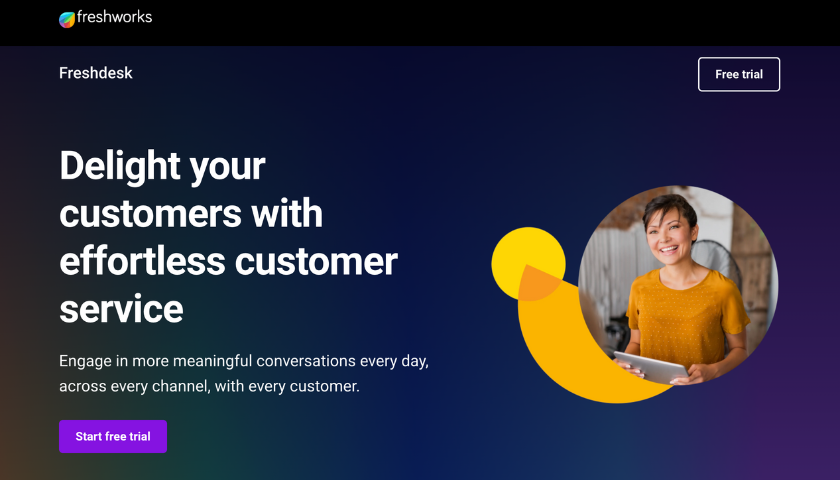
Freshdesk is a cloud-based customer support software from Freshworks Inc. It is positioned as a direct and formidable competitor to Zendesk. Its origin story is a classic example of market disruption. It was set up in Chennai, India, in 2010. This happened after founder Girish Mathrubootham came across a Hacker News thread where users were complaining about a significant price increase by Zendesk.
This is the top omnichannel customer service software for businesses (SMB to Enterprise) looking for a feature-rich, user-friendly alternative to Zendesk.
Features:
- Freddy AI (Agentic AI Solution): A full AI engine. It has autonomous Al Agents that can fully solve tickets, an AI Copilot for human agents, and AI Insights for analytics.
- Omnichannel Inbox: Brings together all customer conversations from email, phone, chat, social media, and web portals into a single smart inbox.
- Advanced Ticketing System: Strong features for automated ticket assignment (round-robin, skill-based), prioritization, and SLA management.
Pros:
- It is frequently talked up for its ease of use, intuitive interface, and simple setup. This leads to quick team use.
- It is often seen as handing out better value for money compared to its main competitors.
- It comes with a very generous free-forever plan for up to 10 agents. This is a major advantage for startups.
Cons:
- While feature-rich, some users think the sheer number of options and settings is too much.
- Several users, particularly on Reddit, talk about subpar experiences with Freshdesk's own customer support. This mirrors complaints against Zendesk.
- One Reddit user called the company a scam. This was because of a difficult cancellation process and continued billing after they tried to cancel. This indicates potential issues with business practices similar to those reported for Zendesk.
- Some users talk about a clunky UI, odd limitations, and slow support.
Freshdesk Pricing:
- Uses a tiered, per-agent, per-month model with a strong free plan.
- Free: $0 for up to 10 agents (Email & social ticketing, knowledge base).
- Growth: $15/agent/month (annual billing).
- Pro: $49/agent/month (annual billing).
- Enterprise: $79/agent/month (annual billing).
- Note: AI features like Freddy Al Copilot come as an add-on ($29/agent/month).
6. Gorgias AI

Gorgias is a customer support help desk built from the ground up specifically for the e-commerce industry. Its entire architecture is built to turn customer service into a revenue-generating channel. Serving over 16,400 merchants, it has become the #1 rated helpdesk in the Shopify App Store.
This is the top omnichannel customer service software for e-commerce, especially Shopify stores, that need deep platform connections.
Features:
- Deep E-commerce Connection: This is its main selling point. It deeply connects with Shopify, BigCommerce, and Magento. Agents can view order history and carry out actions like editing orders, issuing refunds, and canceling orders without leaving the helpdesk.
- AI Agent and Automation: Makes use of AI to automate up to 60% of common e-commerce inquiries like "Where is my order?" (WISMO).
- Revenue Generation Tools: Comes with live chat and an AI shopping assistant to recommend products. It also includes revenue attribution to keep track of sales generated by the support team.
Pros:
- It is universally called a game-changer for e-commerce teams. This is because of its unmatched, deep Shopify connection.
- It effectively pulls together all e-commerce communication channels (email, chat, social) into one dashboard.
- Its automation features (Rules, Macros) are highly effective for dealing with common e-commerce inquiries.
Cons:
- A significant and common complaint is the platform's lack of stability. A viral Reddit post called the platform consistently unstable with frequent bugs and slow loading times.
- The ticket-based pricing model with high overage fees is a big problem. Costs can jump up unexpectedly during high-volume periods like holiday sales.
- A double charge scenario can happen. An AI resolution from the Gorgias Automate add-on can use up a billable ticket from the main plan while also incurring its own fee.
- Users on other platforms like BigCommerce say features are significantly less built out than for Shopify.
Gorgias AI Pricing:
- Employs a ticket-based pricing model. You pay based on the volume of billable tickets.
- Starter: $10/month for 50 billable tickets.
- Basic: $60/month for 300 billable tickets.
- Pro: $360/month for 2,000 billable tickets.
- Advanced: $900/month for 5,000 billable tickets.
7. Zoho Desk
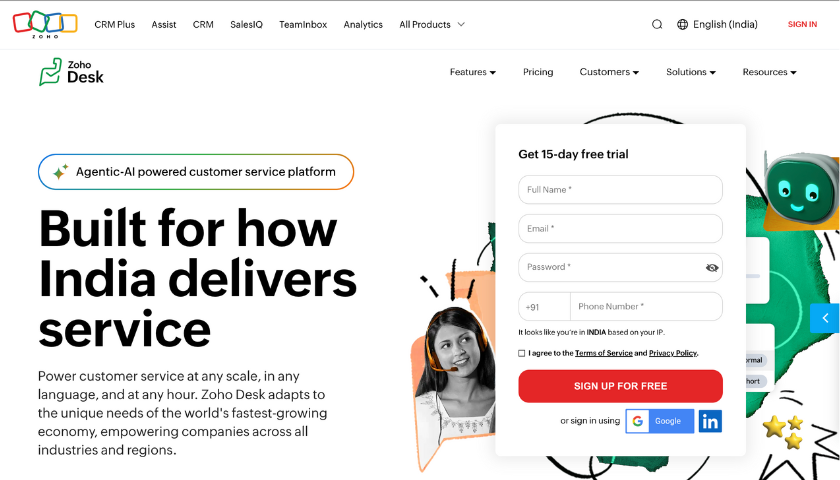
Zoho Desk is the cloud-based customer support platform within the extensive Zoho suite of business applications. Its market position is defined by its deep connection with the broader Zoho ecosystem (especially Zoho CRM). It is also known for its great pricing. This pricing gives users exceptional value. It is positioned as the industry's first context-aware help desk.
This is the top omnichannel customer service software for businesses, especially existing Zoho users, looking for unbeatable value within a unified ecosystem.
Features:
- Omnichannel Ticket Management: Pulls together inquiries from email, phone (cloud telephony), chat, social media (Facebook, Twitter), and instant messaging (WhatsApp, Telegram).
- AI-Powered Assistance (Zia): Zoho's AI assistant can automate tasks, suggest relevant solutions, analyze customer sentiment, and auto-tag tickets.
- Remote and AR Support: Unique to this list, Zoho Desk comes with features for on-demand remote support sessions. It even has Augmented Reality (AR) support, where technicians can use a customer's live camera feed to hand out visual guidance.
- Deep CRM Connection: As the context-aware help desk, its native connection with Zoho CRM hands out a complete view of the customer's sales and purchase history.
Pros:
- The most universally talked-about aspect is its affordability and value. It comes with a complete feature set at a price point that is significantly lower than its competitors.
- For businesses already in the Zoho ecosystem, the native connection is a major advantage. It creates a unified system for a 360-degree customer view.
- The breadth of features, even on low-priced plans, is impressive. It competes with much more expensive enterprise-grade solutions.
Cons:
- The main complaint is the steep learning curve. The user interface can feel messy, unintuitive, and outdated.
- Initial setup often takes significant time and effort.
- Some users say that the platform can be slow or experience performance issues at scale.
- Third-party connections outside of the Zoho suite are few compared to competitors.
Zoho Desk Pricing:
- This is its biggest competitive advantage. It is a per-agent model that is substantially more affordable than competitors.
- Free: $0 for up to 3 agents (Email Ticketing, Private Knowledge Base).
- Standard: $14/agent/month (annual billing).
- Professional: $23/agent/month (annual billing).
- Enterprise: $40/agent/month (annual billing) (Comes with Live Chat and Zia AI).
8. Salesforce Service Cloud
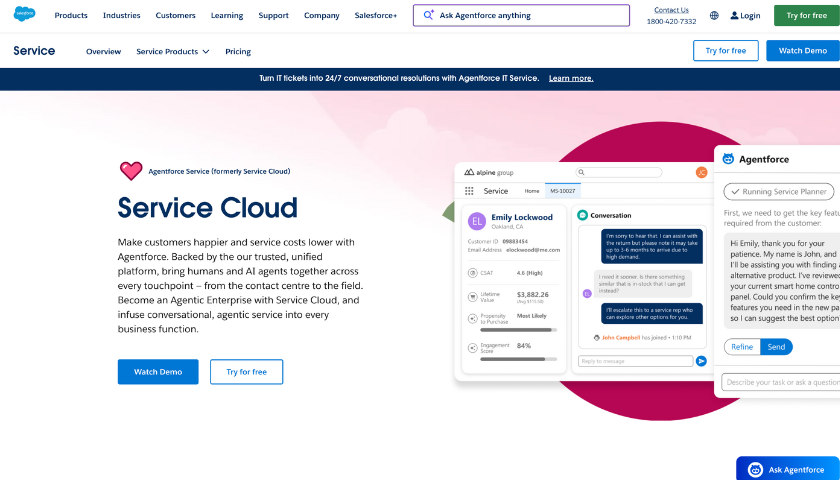
Salesforce Service Cloud is the enterprise-grade customer service component of the Salesforce Customer 360 platform, the world's #1 AI CRM. Founded in 1999, Salesforce pioneered the SaaS model for CRM. Service Cloud is built for extreme growth, customization, and deep connection with the entire Salesforce ecosystem.
This is the top omnichannel customer service software for large enterprises that need extreme customizability, room to grow, and connection with the Salesforce CRM.
Features:
- Lightning Service Console: A unified agent workspace that hands out a 360-degree view of the customer. Agents can look at all case history and customer data from the main CRM in one place.
- AI-Powered Service (Einstein and Agentforce): Salesforce has heavily invested in AI. This has Einstein AI for case classification and suggested replies. It also includes the newer Agentforce platform (launched September 2024) for setting up autonomous Al agents to handle tasks like processing refunds.
- Omni-Channel Routing: A main component that intelligently sends work (cases, leads, chats) from any channel. It sends them to the most appropriate, available agent based on skills or workload.
- Service Cloud Voice: Natively links telephony into the Service Console. This hands out real-time call transcription and AI-based recommendations during calls.
Pros:
- The most frequently talked-about advantage is its extreme customizability. The platform can be changed to match almost any complex business process. It can also scale up to support the largest global enterprises.
- The smooth 360-degree customer view from the main Salesforce CRM is invaluable for handing out personalized service.
- Its automation functions (via Flow) and advanced AI (Einstein, Agentforce) are known as major strengths.
Cons:
- The biggest drawback is its high complexity and steep learning curve. The platform is not intuitive. Realizing its full potential almost always needs dedicated, trained Salesforce professionals.
- It is one of the most expensive solutions on the market. The high license fees, combined with the cost of necessary add-ons and specialized setup, result in a very high total cost of ownership.
- Many users still think the Ul is cluttered, unintuitive, and slow, even with the Lightning interface.
- Some Reddit users say that newer features, such as Service Cloud Voice, can be buggy and unreliable.
Salesforce Service Cloud Pricing:
- Complex, tiered, and set at the premium end of the market.
- Pro Suite: $100/user/month (annual billing).
- Enterprise: $175/user/month (annual billing).
- Unlimited: $350/user/month (annual billing).
- Agentforce 1 Service: $550/user/month (annual billing).
- Note: Many needed features like Digital Engagement (Chat) and advanced AI are often costly add-ons.
9. Tidio
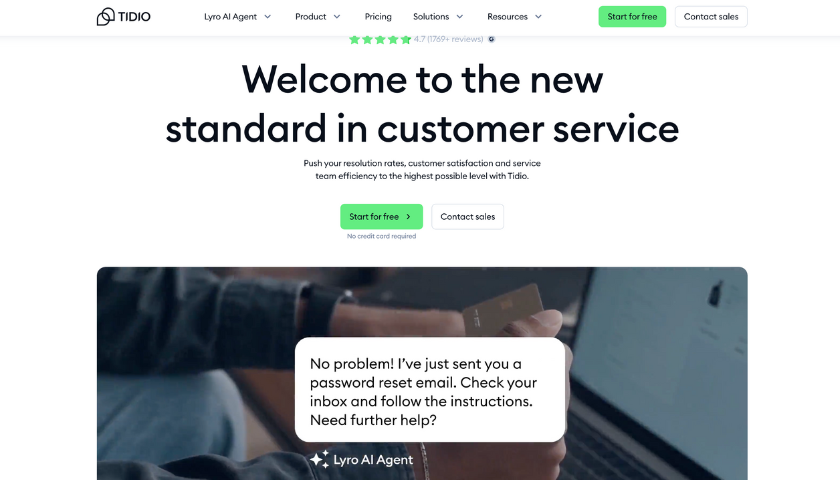
Tidio is a customer service platform built to be accessible, affordable, and effective for small-to-medium businesses (SMBs) and e-commerce stores. Founded in 2013 in Poland, it comes with a suite of tools like live chat, AI-based chatbots, and a help desk in a single, user-friendly interface.
This is the top omnichannel customer service software for small businesses and e-commerce stores looking for ease of use and affordable AI chatbots.
Features:
- Lyro AI Agent: Tidio's conversational AI. It is built to answer common questions, perform order updates, and offer up product recommendations. Tidio says it can automate up to 67% of a support team's workload.
- Flows (Chatbot Builder): A visual, no-code workflow builder. It comes with over 40 templates for use cases like lead generation, saving abandoned carts, and answering FAQs.
- Omnichannel Inbox (Tidio Helpdesk): Pulls together conversations from live chat, email, Facebook Messenger, Instagram, and WhatsApp into a single shared inbox and ticketing system.
- E-commerce Connections: Connects with Shopify, WooCommerce, and other platforms. This allows agents to view cart contents and look at order history from the chat window.
Pros:
- The most frequently talked-about aspect is its ease of use and quick setup. Users say they are setting up the chat widget live in minutes without technical expertise.
- The Lyro AI and visual "Flows" builder are highly liked. They effectively deal with common questions and automate workflows.
- It is considered very affordable. It has a generous free plan that lets businesses test main functions.
Cons:
- A common complaint is that the customization options, particularly for the chat widget, are somewhat few.
- While perfect for SMBs, it does not have the advanced features, deep analytics, and permissions needed by large enterprises. It is a tool businesses may outgrow.
- Some users talk about issues with the mobile app. For example, being logged out periodically or being less responsive.
- One Reddit user strongly advised against using Tidio for reselling chatbots. They said their account was suspended without reason.
Tidio Pricing:
- A flexible model based on the volume of "Billable conversations" (handled by a human) or AI usage.
- Free: $0 for 50 billable conversations/month, 10 agents, and 50 lifetime Lyro AI conversations.
- Starter: $24.17/month (annual billing) for 100 billable conversations/month.
- Growth: Starts at $49.17/month (annual billing) for 250+ conversations.
- Note: Lyro AI can be purchased standalone, starting at $32.50/month for 50 conversations.
FAQs on Omnichannel Customer Support Software
What is the difference between omnichannel and multichannel?
Multichannel means you have support on multiple channels (e.g., email, chat, phone). But these channels are not linked up. An agent handling an email might not see a customer's previous chat. Omnichannel means all these channels are brought together into a single, continuous conversation. This hands agents full context and sets up a smooth experience for the customer.
What is the best free omnichannel software?
Several platforms have useful free plans. Thunai, HubSpot Service Cloud, Freshdesk, Zoho Desk, and Tidio all have free-forever tiers. The best one hangs on what you need. Freshdesk and Zoho Desk are generous with free agent seats. HubSpot links up well with its CRM. Thunai lets you try out agentic AI and unlimited seats.
What is agentic AI in customer service?
Agentic AI has moved past simple chatbots. A chatbot is trained to answer questions and deflect simple queries. An AI agent, like those in Thunai or Salesforce's Agentforce, is built to carry out actions. It also automates multi-step workflows. The agent can work with other software on its own (like your CRM or e-commerce platform) to solve an issue without human intervention.
Why is per-agent pricing a problem?
The per-agent (or per-seat) pricing model is a key financial pain point for many businesses. This directly links your software costs to your team's headcount. This means every time you hire a new support agent (even part-time), your monthly bill increases. Or, this happens when you add a manager who just needs to view reports. This model holds back growth. It can make growing a support team too expensive.
What is the difference between Zendesk and Thunai?
Zendesk is a mature, market-leading help desk platform. This is great for ticket-based support and is priced on a per-agent model. Thunai is an emerging AI-native automation platform built around an AI brain and agentic AI. This is built to automate entire workflows (not just manage tickets). It uses a disruptive unlimited seats pricing model based on AI usage, not headcount.
Try out AI with Thunai to get real results where they matter most. Use AI agents to help speed up processes. Try Thunai for free and see how we make your knowledge work for you!




